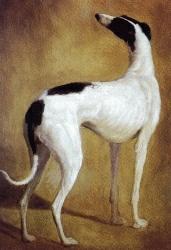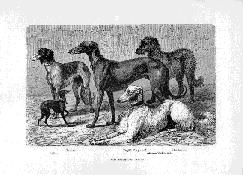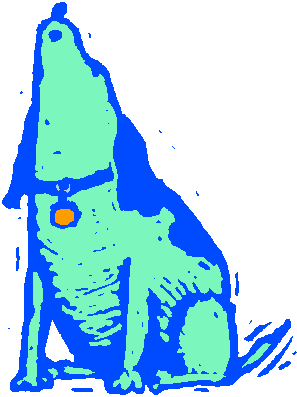|
spay/neuter / tips / greyhounds / news / quotes / stories / books / links / happily ever afters / mission / get in touch / home |
|
|
††††††††††††††by Diane Bracuto, L.V.T.†
Have you ever wondered however what happens to† these dogs when their racing days are over?† For many greyhounds their racing days are over before they even start. If they are too slow or do not show the necessary competitive spirit and drive to win, they may never actually reach the track. Others may remain on the track for varied amounts of time, some being as short as months and others lasting years.
One
of the most common reasons for these dogs to have their career come
to an† end is an injury which
interferes with their ability to run or more to the point, to win. At
this point too many of them still end up euthanized, at times in a cruel
and heartless manner, while others are lucky enough to find themselves† part of a greyhound adoption program. Greyhound
adoption can be a wonderful experience, but first, let me give you a
little background on the breed itself.
Greyhounds
are one of the oldest breeds and can be traced back to temple drawing
in Southwest Turkey in the year 6000 B.C.†
It was in Egypt however that the breed really came into itís
own and were cherished pets of Egyptian royalty†
as well as hunting partners. Throughout history you can find
references to this swift and noble beast.†
It
is this ability to keep their prey in sight and to have the natural
instinct to do so which led to what is now the spectator "sport"
of greyhound racing in this country. In the early 1900's it was realized
that there was money to be made in wagering on these dogs as they flew
around the track at speeds of up to 45 MPH. Unfortunately this ability
has led to them being exploited in many ways as can happen when you
depend on an animalís performance for your livelihood.
Some
greyhounds are trained using
live lures such as rabbits† while
others are trained to chase a plastic lure which is used during the
actual race. Despite the fact that the National Greyhound Association
officially advises itís associates to use mechanical lures they also
do not censure anyone for using live bait. Even people who are proponents
of greyhound racing feel that this practice is inhumane, barbaric and
unnecessary. Depending
on which trainer a greyhound ends up with their life on the track can
range from tolerable to quite harsh.†
There are many trainers who profess a love for their dogs and
try to treat them as kindly as possible, while to others they are simply
a means to an end. The trainer a greyhound is assigned to can make all
the difference in the quality of their life. Racing
greyhounds are tattooed for identification purposes on the inside flap
of† their ears. There have sadly
been many reports of† finding
mass graves of greyhounds who have been euthanized in horrible ways
such as electrocution, shooting or even starvation. The dogs killed
in this manner usually have their ears removed so they could not be
identified and traced back to any particular kennel. One of the most
recent reports was printed in USA today and reported on†
the mass graves of 45 greyhounds in OíFallon, Missouri, most
of which had their ear flaps removed. There are also many greyhounds
who end up being sold to laboratories at the end of their careers. They
are in great demand for this purpose since they are calm, gentle, well
socialized dogs who are of a good size and usually will stoically tolerate†
often painful procedures. Such is the plight of these magnificent
animals.† To the people who have known and loved this
breed this is particularly difficult to deal with.
Many people hold the misconception
that retired racers may be high strung, or elderly or are only suited
for racing. I am happy to report that is not the case.†
In general I find sight hounds
a very easy class of dog to live with. They are often very quiet, laid
back and extremely fastidious about their personal habits which make
them easy to housebreak. Many of the dogs who come off the track already
seem housebroken to their new owners since they learn so quickly. They
also have a great sense of humor. They can be clowns and will make you
laugh and fill your heart with joy if you let them. Some of them even
know how to "smile". Greyhounds can make wonderful family
pets as well as loving companions for single or elderly people.† They are not however for everyone.
If you are looking for a dog
who will be a great watchdog you may be disappointed.† Although some greyhounds can perform this duty,
others do not. Greys by nature are not aggressive animals so they are
usually not suited for guard duty although some will bark if a stranger
approaches.
Sight hounds in general are
very sensitive and do not usually respond to the same type of training
that you might give a breed such as a Labrador retriever or German Shepherd
or any one of a number of breeds who have a "working" type
of attitude. This does not mean however that greyhounds are unintelligent
or that they cannot be trained. It just means that you need to be flexible
and find the methods which suit them best.
They can never† be trusted off† leash. They
must be exercised in a fenced† enclosure.
Donít forget that these dogs instinctively hunt by sight, so if they
catch sight† of a squirrel for
instance, they can be gone in the blink of an eye. Because of the single
mindedness to their running while in pursuit, they will run right into
the path of oncoming vehicles. They also can run so far†
so quickly that they may become lost. It is not a good idea to
let any dog roam free, but it is particularly dangerous in sight hounds. Many people who adopt greys
find themselves acquiring† more
of them over time. They can become addictive!! Greyhounds are a good
size dog with the range for females being as little as 40 to as much
as 80 pounds. Males can range in size from 50 _ 90 pounds. They normally
get along quite well with other dogs, but as with any addition to your
household you need to explore your dogís temperament and your housing
situation.† Most greys are already
used to being crated and adapt well to your using a crate as part of
your training program while providing a safe haven for your new pet.
Greyhounds come in variety
of colors from white† to solid
black and† almost every color
There are many different types of
adoption programs available today. There are wide variations in adoption
fees as well as what is included for that fee. Some adoption groups
charge a minimal fee and you basically get a dog who will still need
to be spayed/neutered, may need to have their teeth cleaned (this is
because of the diet they are fed on the track), or†
may require heartworm tests or worming.. Other adoption groups
may charge a higher fee but the dog you get may already be altered,
have its teeth cleaned, be heartworm negative, bathed ,and be free of
internal and external parasites.† Each
group sets its own fee schedule and provisions so you need to ask individual
groups what their policies are in this regard.
Some people express fear about
adopting a greyhound if they own a cat or other small pets. The majority
of greys get along fine with these small animals but there are some
who may have been exposed to less then ideal training techniques or
whose prey drive is particularly strong. For those dogs I would suggest
placement in a home without small pets. I can tell you I have seen many
greys snuggle and sleep with cats and become good friends with them.
However, these same dogs may view these cats differently if they were
in an open area together outside and the cat started to run. This is
why you need to do you homework and connect with an adoption group that
you feel you can trust and turn to with any questions or concerns that arise.
Many greyhounds are placed
in foster homes initially when† off
the track so their temperament and needs can be assessed. I started
fostering greys back in the 70's while living in NJ and working as a
veterinary technician. We worked with a greyhound adoption group and
I got to see first hand how very sweet these dogs were and it made me
want to lend a hand by being a foster mom. I am going to list some resources
that I think any prospective greyhound owner may want to check out.
There are adoption center numbers, web pages and books that can all
prove very useful.† Some adoption centers have the facilities to
let you visit all their dogs and bring your whole family including the
four legged members to see how they interact with each other. (I prefer
this type of arrangement when it is possible).Other adoption groups
do not have the space or financial resources to offer†
those types of facilities and the dogs will come directly to
you from the track or from a foster home. As with any†
rescue group, be prepared to be interviewed. These people have
worked hard to give these dogs a better life so they want to be as careful
as possible to see that the match that is made will last a lifetime.
While you may be saving a life, you are also receiving a wonderful gift.
Resources Adopting the Racing Greyhound† by
Cynthia Branigan published by Howell Books. This is a wonderful book
that I strongly suggest reading first before making a decision about
adoption. This book† goes into
a lot more detail then space allows me to here on various training guides,
health issues, etc. It really explains what to expect when you get your
greyhound home.
The Greyhound : An Owner's Guide to a
Happy Healthy Pet by Daniel Braun Stern Greyhound Tales : True Stories of Rescue,
Compassion and Love
by Nora Star (Editor) Guide to Adopting an Ex-Racing Greyhound by Carolyn Raeke. Paperback The Reign of the Greyhound : A Popular
History of the Oldest Family of Dog
by Cynthia
A. Branigan The Ultimate Greyhound by Mark Sullivan
|
spay/neuter / tips / greyhounds / news / quotes / stories / books / links / happily ever afters / mission / get in touch / home
†
 We
have probably all seen the images, whether in person, or in the media,
at a dog track
We
have probably all seen the images, whether in person, or in the media,
at a dog track



